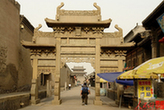History
In the Spring and Autumn Period, Guan Zhong was the first Chancellor in China, who became chancellor under the state of Qi in 685 BC. In Qin during the Warring States Period, the Chancellor was officially established as "the head of all civil service officials". There were sometimes two Chancellors, differentiated as being "of the left" (senior) and "of the right" (junior). After emperor Qin Shi Huang ended the Warring States Period by establishing the Qin Dynasty (221-206 BC), the Chancellor, together with the Imperial Secretary, and the Grand Commandant, were the most important officials in the imperial government, generally referred as the Three Lords.
In 1 BC during the emperor Ai, the title was changed to da si tu (大司徒).In the Eastern Han Dynasty, the Chancellor post was replaced by the Three Excellencies: Grand Commandant (太尉), Minister over the Masses and Minister of Works (司空). In 190, Dong Zhuo claimed the title "Chancellor of State" (相国) under the powerless Emperor Xian of Han, placing himself above the Three Excellencies. After Dong Zhuo's death in 192, the post was vacant until Cao Cao restored the position as "Imperial Chancellor" (丞相) and abolished the Three Excellencies in 208. From then until March 15, 220, the power of Chancellor was greater than that of the emperor. Later this often happened when a dynasty became weak, usually some decades before the fall of a dynasty.
During the Sui Dynasty, the executive officials of the three highest departments of the empire were called "Chancellors" (真宰相) together. In the Tang Dynasty, the government was divided into three departments: the Department of State Affairs (尚书省), the Chancellery 门下省) and the Secretariat(中书省) and the head of each department was generally referred to as the Chancellor.
In the Song Dynasty, the post of Chancellor was also known as the "Tongpingzhangshi" (同平章事), in accordance with late-Tang terminology, while the vice-chancellor was known as the "Jijunsi". Some years later, the post of Chancellor was changed to "Prime Minister" (首相 shou xiang) and the post of vice-Chancellor was changed to "Second Minister" (次相 ci xiang). In the late Southern Song Dynasty, the system changed back to the Tang naming conventions.
During the Mongol-founded Yuan Dynasty, the Chancellor was not the head of the Secretariat, but the Crown Prince (皇太子) was. After the establishment of the Ming Dynasty, the post became the head of the Secretariat again. The post was abandoned after the execution of the Chancellor of China, Hu Weiyong, who was accused of treason (though his conviction is still strongly disputed in present times because of a lack of evidence to prove his guilt). Still, appointments of the people who held the highest post in the government were called "Appointment of Prime Minister" (拜相) until 1644.
Editor:JinXin





Why not rent a boyfriend, or girlfriend to please parents during the Spring Festival?